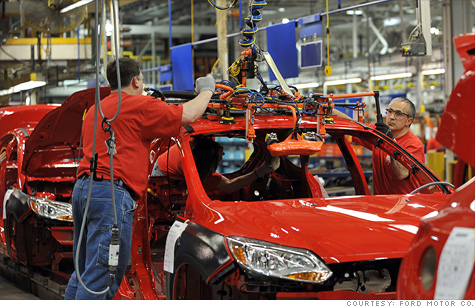Search News

Automakers will add 200,000 jobs in the next few years, most of them in the Midwest.
NEW YORK (CNNMoney) -- The auto industry will produce a jobs boom in the battered Midwest over the next four years, according to a new forecast.
The Center for Automotive Research, a respected Michigan think tank, estimates that automakers and auto parts suppliers will likely need to hire about 200,000 workers by 2015 in Michigan, Ohio and Indiana, the nation's auto belt that has seen massive job losses in recent years.
While part of that hiring would replace retiring workers, the hiring boom should leave the three states with a net gain of about 150,000 auto jobs.
And it will go a long way to recouping the auto jobs lost during the past 10 years -- employment in the sector in the three states has fallen by just over half, or 274,000 jobs, since 2001, according to the Bureau of Labor Statistics.
The job gains are due to forecasts of a modest recovery in auto production, as well as recent labor deals with General Motors (GM, Fortune 500), Ford Motor (F, Fortune 500) and Chrysler Group.
All three labor deals this past fall included promises to hire new employees to build the next generation of cars and trucks. And that will prompt additional hiring at auto parts suppliers.
GM has promised to add or retain 6,400 workers in its labor deal, while Ford promised to add almost 6,000 and Chrysler 2,100.
The Center for Automotive Research's estimates for hiring are pretty conservative by comparison, projecting only about 10,250 additional hourly workers at the traditional Big Three. But it also projects the companies will add more than 20,000 salaried workers -- plant supervisors, as well as engineers and other technical staff -- that aren't in the United Auto Workers union.
The bigger gains will come from the increased hiring from auto parts suppliers, along with some additions at Midwest facilities of overseas automakers.
Overall, the Center for Automotive Research estimates the industry will need to add almost 170,000 jobs nationwide by 2014, with most in Michigan, Ohio and Indiana. Replacing retirees who leave the industry could require about 50,000 more hires.
That's not nearly enough to recoup all the jobs lost by the industry in recent decades. But it would represent a significant shot in the arm for the battered auto states -- assuming the employers can find the help they need.
Michigan, Ohio and Indiana have about 1.2 million unemployed. But there's a labor shortage for skilled positions.
"We're talking to suppliers who are capacity restrained who are having trouble finding the employees they need," said Kristin Dziczek, director of the labor and industry group at the Center for Automotive Research and one of the authors of the study.
Dave Andrea, head of industry analysis and economics for the Original Equipment Suppliers Association, an auto parts trade group, said he thinks the forecasts are reasonable.
He said his group's members were forced to cut deeply to survive the crisis of 2009, and they've been scrambling to rebuild their staffs.
"You drive around this area, and you still see signs in front of closed factories that are still for sale or lease, but you also see billboards of companies looking for help," he said.
Dziczek said a big part of the problem is that so many of the people who lost jobs took early retirement packages and many aren't likely to return to the labor force. And there aren't as many experienced manufacturing workers sitting around still looking for jobs.
"It's like these employers are all looking for these elusive unicorns -- people with five to eight years of experience who don't cost too much, don't require much training," she said. "We're going to run out of unicorns soon, if we haven't all ready." ![]()
| Overnight Avg Rate | Latest | Change | Last Week |
|---|---|---|---|
| 30 yr fixed | 3.80% | 3.88% | |
| 15 yr fixed | 3.20% | 3.23% | |
| 5/1 ARM | 3.84% | 3.88% | |
| 30 yr refi | 3.82% | 3.93% | |
| 15 yr refi | 3.20% | 3.23% |
Today's featured rates:
| Latest Report | Next Update |
|---|---|
| Home prices | Aug 28 |
| Consumer confidence | Aug 28 |
| GDP | Aug 29 |
| Manufacturing (ISM) | Sept 4 |
| Jobs | Sept 7 |
| Inflation (CPI) | Sept 14 |
| Retail sales | Sept 14 |